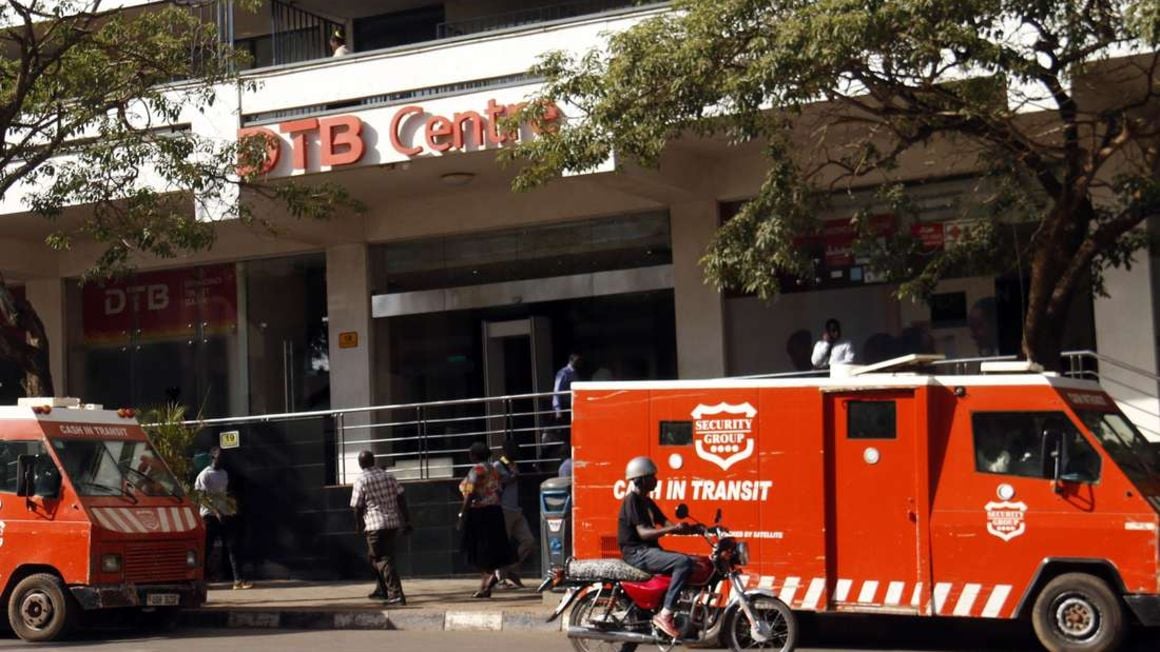
DTB Centre in Uganda. FILE PHOTO | NMG
Summary
- The Bank of Uganda said it did not regulate lending that involved “using funds obtained from foreign banks that do not take deposits from the public in Uganda.”
- Though the Bank of Uganda’s position does not override the court’s ruling, it boosts chances of a successful appeal by Diamond Trust Bank (DTB), which was the subject of a commercial court ruling.
- Justice Adoyo argued that DTB Kenya was a foreign bank and that the lender was required to seek authorisation from Uganda’s central bank, the industry regulator, before engaging in activities such as lending and extending facilities in Uganda.
Uganda’s central bank has said foreign-based commercial banks do not need its approval to lend funds originating abroad, bringing relief to Kenyan banks that had been rattled by a court ruling last week that declared some syndicated loans illegal.
The Bank of Uganda said it did not regulate lending that involved “using funds obtained from foreign banks that do not take deposits from the public in Uganda.”
“Foreign banks lending deposits held in jurisdictions other than Uganda are regulated and supervised by their home authorities,” it said in a statement. “It is not mandatory for a foreign bank to establish a representative office in Uganda in order to conduct lending.”
Though the Bank of Uganda’s position does not override the court’s ruling, it boosts chances of a successful appeal by Diamond Trust Bank (DTB), which was the subject of a commercial court ruling.
Uganda’s Commercial Division Judge Justice Henry Peter Adoyo last week ruled that DTB, together with its Ugandan subsidiary, DTB Uganda, acted illegally by jointly lending money to Ham Enterprises Ltd and Kiggs International (U) Ltd, owned by Ugandan businessman Hamis Kiggundu.
Both banks had put together syndicated loans for Mr Kiggundu and his businesses over several years. But after a dispute over repayments Kiggundu sued, arguing the loans were illegal because the Kenyan bank did not have a Ugandan banking licence issued by the central bank.
In his ruling, Justice Adoyo argued that DTB Kenya was a foreign bank and that the lender was required to seek authorisation from Uganda’s central bank, the industry regulator, before engaging in activities such as lending and extending facilities in Uganda.
“I am of the considered opinion that indeed by their way of very actions the Respondents (DTB Uganda and DTB Kenya ) committed illegalities when money facilities were rendered by the 2nd respondents (DTB Kenya) to the 1st and 2nd Applicants (Ham Enterprises and Kiggs International Ltd) without prior authorisation of the [Central] Bank even where such funds were availed outside Uganda for the import of the Financial Institutions Act is that prior authorisation is required of the Bank of Uganda was a prerequisite,” said Mr Adoyo in his ruling dated October 7, 2020.
The judge also ruled that it was illegal for DTB Uganda to act as an agent for its parent firm (DTB Kenya) in the syndicated loan without written approval from the Bank of Uganda.
Uganda’s Central Bank has, however, differed with the judge’s assertions, saying its regulatory powers are limited to “financial institution business conducted by BoU-licensed entitites in or outside Uganda or activity which should be licensed as such in Uganda”
It added: “These powers do not extend to activities of foreign banks outside Uganda licenced by foreign regulators.”
The court ruling triggered concern among banks in Kenya, with the Kenya Bankers Association (KBA) warning of cautionary measures by its members servicing customers in Uganda.
“I think the matter is still appealable but right now the position we are taking is precautionary because this case will affect the ease at which syndicated loans come into the market,” KBA chief executive Habil Olaka told The EastAfrican.
Ugandan banks have traditionally relied on syndicating big credit lines with parent banks in bigger markets to serve major corporate customers and the ruling, which has been appealed, put the fate of such loans in doubt.




No comments :
Post a Comment